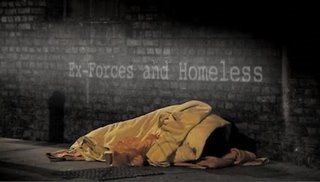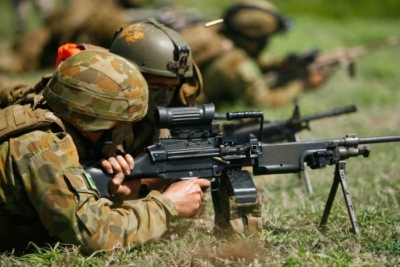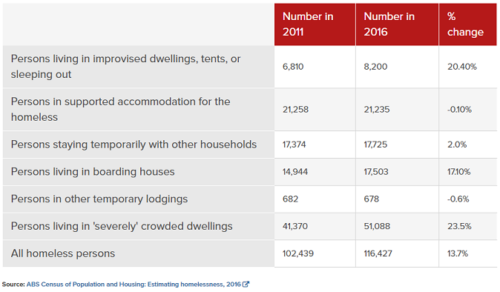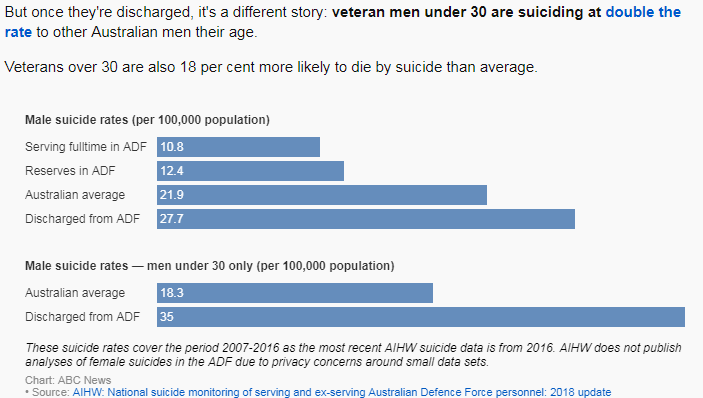Homelessness and Veteran Suicide – a Side Issue in the 2019 Federal Election

Homelessness is often an extension or effect of a person’s wellbeing, rather than a first presentation. Australia’s suffering and sometimes under assisted veteran community resides in a misunderstood and under resourced space. The increasing number of servicemen and women, who are destitute and living rough on the streets, has amounted to an estimated ten to 20 percent of homeless Australians, according a recent study by the University of Western Australia. There must be an ongoing, dedicated and immediate federal government response to this increasingly worsening issue, which is largely being left out of this year’s federal election discussion.
While the Productivity Commission is investigating anomalies in the current systems, I believe it will do little to affect a timely and absolute change. In seeking to improve the lives of veterans who are yet to present in crisis, we must consider the values by which we estimate their needs and what we have available to tender in response. It is my opinion that under existing operating structures, that ability amounts to very little across the board and in accepting that as the standard, we are letting our veterans down in potentially fatal ways.
On too many occasions I have seen physical and psychological injuries stemming from service. I have seen these follow the veteran and their family into their civilian lives, causing acute presentation time-and-again. Even occasional interference in their civilian lives has harmful and lasting effects on the individuals and their supports. Combine such events with perceptions of adversarial compensation systems and the government’s lack of commitment to sustaining effective first-response services, and veterans will feel they are less likely to be reached when experiencing a crisis. This is a potential mental health boiling point and can lead to significant psychological episodes for veterans’ and their kin.
While many more veterans are likely to be facing increasingly difficult journeys in their post service lives, we need to adjust to finding solutions first and looking to measure the reasons and effective program responses post acuity. It is difficult to measure previous means of dealing with these matters as data from WWI, WWII and Vietnam is not readily available. However, I believe the Australian public has an expectation that when we send our troops to war, they are cared for absolutely upon their return home. I know veterans hope this is the case.

Our culture has a tradition of ceremonial and commemorative events, but in the modern paradigm we must accept a more holistic responsibility in the care, welfare and wellbeing of our soldiers and their families as they reintegrate into the community.
Current spending models focus on providing millions towards studies and reports about known issues, rather than tackling critical events as they evolve at the coalface.
While this is a proven method of addressing serious situations, I believe it is this responsive approach that needs our immediate attention. While this may be difficult for bureaucrats to absorb, a decisive, proactive and dynamic approach will develop into more effective solution focused outcomes for those affected and make studying the significant (underlying) issues much more worthwhile for those who follow.
Although it is agreed we need to study and quantify needs versus program distribution, in order to ensure best practice examples are brought to the fore, we must act as a taskforce to attack the salient issues, rather than as an occupying entity sustaining the status quo.
Ownership of disaster is far different than dispensing with the strategies and barriers that create symptoms. Simply put, we cannot just conduct studies and research at the cost of allowing those presently involved in crises to sweat out their existence, in an prolonged wait for academics to present and proliferate potential theories for and on behalf of government.
Unfortunately I expect to see a total reversal of current funding assistance in the next financial year and handover to state based providers and traditional ex-service organisations. So while the RSL and other ex-service organisations again plan to change lanes in a bid for cash grabs and perceived relevance with younger veterans and their families, many in the cohort will continue to suffer with inadequate service provision when and where it is needed – while they are in a crisis – I suggest this will ultimately and needlessly cost more lives.
Veteran suicide and homelessness have become one of the most salient aspects of contemporary veteran wellbeing discussions. It is almost possible to see the ebb and flow of the traditional ex-service organisations as they track what service delivery best attracts the money and makes them seem relevant. With this phenomenon now obvious on the east coast, more emphasis must be directed towards resourcing evidence-based intervention programs that actually work, rather than those that are being piloted years after the effect has already taken a stronghold. The assertive outreach we provide under our current contract is tested and proven with more than four-hundred connections and case managed outcomes.

The federal government must stop the trend of passing the baton of homelessness to the states and territories where the people they are supposed to be assisting were employed by Defence. I call on the Department of Veterans’ Affairs to ante up with sufficient and sustainable funding so we can continue the acute service delivery we have pioneered since 2015.
Alternatively, I call upon the Minister to put pressure on the RSL corporate giants in QLD, NSW and VIC to provide access to the hundreds-of-millions of dollars that is being hoarded in wealthy sub-Branches, while smaller, dedicated and expert agencies already operating in this space, are begging for change to keep doors open and programs operational. RSL entities have long claimed they will only resource select programs that are in their area of operations. I say we have Australian veterans not just local to the money veterans and where funding is lacking in an ESO or specific area, the wealthy RSLs must pay it forward.
Yesterday’s RSL forum with Minister of Veterans’ Affairs, the Honourable Darren Chester MP and Shadow Minister of Veterans’ Affairs, the Honourable Amanda Rishworth MP, made it clear they want state governments, ex-service organisations and existing homelessness agencies to manage the growing phenomenon of veteran homelessness, but neither provided any indication as to how this was costed or would be funded. This likely means we will see a continuation of insufficient funding models, which will fail to address a better cultural understanding of the specific challenges our veterans face in their post service years.
Traditional charities often require Centrelink health care cards to allow access to their services. Many we have dealt with lack this component and feel being declined is the end of the road. Hundreds are turned away from state and general charity services every week, we fear our veterans will again end up among that number.

Homelessness in Australia has increased substantially since 2011 when the ABS Census revealed 102,000 homeless Australians, a figure that has jumped by almost fourteen percent to more than 116,000 in 2016.
With hundreds of millions of dollars dedicated to this issue nationally and such severe increases in the numbers, how can our veterans expect to be a priority when their service has left them broken, impoverished and living rough on our streets?
The current approach hasn’t worked in the general community in recent years and given many veterans are unlikely to approach civilian charities when most at risk, these men and women suffer in silence in their cars, under bridges and alone in other dangerous environments.
A veteran rides the trains in Sydney while he waits for the state government there to provide access to crisis accommodation. We hear from him on our 1800 number and offer a hotel, but he refuses citing he is okay riding the trains and sleeping during the day for now. With winter approaching we fear the usual rise in presentations will continue and our capacity will be stretched without immediate funding and assistance to scale our operations.
This week V360 Australia has accommodated an Australian Army veteran with sixteen-years’ service in our privately funded Perth home, which has housed dozens of veterans since opening in February 2016. He is now one of two permanent residents. We are also currently looking to make contact with a newly arrived British veteran who has no income, support or home, so we can offer him support and accommodation.
Approaches to both state and federal governments to assist in this housing project have gone without result and the RSL in WA has ignored our request to have an active financial role in assisting the initiative. Unofficially, they claim to have no funds available for such projects, but they are building a multi-million dollar new headquarters in the Perth CBD.
Despite the rhetoric, this issue won’t be resolved with people who have the ear of government like son-in-law of former Prime Minister Malcolm Turnbull and current RSL NSW president James Brown. I say Mr Brown has been ineffective in dealing with the issue of veteran suicide and homelessness, while instead preferring to draw attention to his own platforms during his tenure as NSW RSL president. He has been seeking an annual salary of more than one-hundred thousand dollars for acting in the traditionally volunteer role.
According to a Sydney Morning Herald article in 2017, Mr Brown’s entry to the position was touted as him ‘vowing to clean up the organisation after months of revelations about alleged financial improprieties including credit card fraud, Brown swept aside the rusted-on leadership of Vietnam veteran John Haines, who had sat on the council for 21 years and faced stern criticism from many quarters including the NSW government for not moving more decisively to tackle the financial scandal.’
The article goes on to say, Mr Brown is ‘juggling his own priorities… has a full-time job involving significant travel and two young children with wife Daisy Turnbull Brown, who tweeted after his election win: “Huge congrats @captainbrown, you got some work ahead of you.” ‘ Now he wants to be paid for this work all the while pursuing what the article claims is ‘widespread speculation, including within the RSL, that Brown will eventually make a tilt at politics himself.’
My opinion of yesterday’s meeting hosted by Mr Brown in Sydney, is that he seemed more concerned about a lack of RSL representation on the War Memorial Board – while discussing the allotted $500m upgrade recently announced by Prime Minister Scott Morrison – than highlighting the lack of real time assistance on the streets of this country with only our organisation dedicated to 24-hour, every day of the year service, acting to intervene in critical cases and deliver safe outcomes for veterans in crisis. Try calling the RSL after hours, no one will answer.
We suggest $500 million promised would fund and resource infrastructure, staff and training for veteran wellbeing operations and centres, which could be accessed by all ESOs in major centres and capital cities across the nation. However, the cronyism that RSL is famous for, in refusing to allow the entry of service dedicated agencies unless they can own the brand and control their activities, has been significant in disallowing unity in the veteran welfare space.
Australia’s veterans continue to suffer without adequate support in critical situations, all-the-while east coast state RSL branches are being reprimanded by the charity watchdog for lack of appropriate governance, overspending and extraneous travel expenses. As well as their inability to account for hundreds of thousands of dollars in taxpayer and public donations, gifting expensive cars to retiring presidents and seeking annual honorariums for presidents performing volunteer roles.
Our suicide prevention app is sitting in an online virtual stasis because we cannot resource less than $1,000 a month to keep it live. All the while government and traditional ESOs want ownership of programs rather than join in an effort to support the effects of these various issues. With proven results in the prevention of grim outcomes, such as vulnerable veterans being left languishing on the streets and others taking their lives, we feel caution is needed. We are happy to relinquish rights, but not those of the veterans our years of critical care experience can provide.

In 2016, then Prime Minister Malcolm Turnbull announced the Government would trial a suicide prevention initiative in Townsville to help Australian Defence Force (ADF) personnel.
He told reporters in Canberra that it was “one of the most important issues and responsibilities for our Government, for any government”.
“We have to go beyond the memorials and the monuments and focus on the men and women, the real challenges they face — ensuring that they are supported,” he said.
“This is a passionate commitment of mine and my Government.
“For me, this is a case of politics being very personal.”
Malcolm Turnbull, ABC News article 11 August 2016.
The following year, 2017, Australia saw the worst recorded number of veteran suicides, reaching more than eighty. Since that time we have seen the number exceed those for the same period between 1999 and 2014.
This year I am aware of at least one death a week, including six since Anzac Day, just less than a month ago. According to statistics, Australian veterans once discharged, are twice as likely as other Australian men to die as a result of suicide. While suicide rates in Australia appear to be very high for males under fifty-five, the numbers are close to double that for discharged veterans.
If the Government addressed suicide rates in the same way they have managed veteran employment programs, I suggest there would be a decidedly different landscape before us beyond 2019/2020. There seems to be an attitude that if they can employ veterans, they are ‘off the books’ and taking care of themselves. In cases where this is appropriate I see the same vision. However, I have recently seen a case where a veteran was assessed as not capable of participating in return to work programs, yet their occupational therapists (who are DVA contractors), pushed for the veteran to have the doctor change the medical certificate so the veteran could remain engaged with the provider.
Occupational therapists and rehabilitation providers are contracted by DVA and charge millions in fees and consultations to progress veterans through rehabilitation programs and into the workforce. Yet, when the veterans they are working with hit a wall or cannot cope with housing, suicidal ideation or other well-being related issues, these providers call V360A and seek our intervention. We cannot charge these providers and without sustainable resourcing, a reliable funding model and scaling of services, I will have to start turning away veterans who are in dire need of our first responder services. History shows us this is often a trigger for self-harm and suicide. Hopelessness and shame are deadly bedfellows.
Our aim is to continue to provide a national first response service to the Australian veteran community and remain engaged with the government to ensure day-to-day aspects of wellbeing in our area of operations is fully and regularly attended to and reported on. However, this costs money and I personally feel this responsibility falls squarely within the remit of the Department of Veterans’ Affairs. As it stands there is no assurance we will be providing services beyond the end of this year and that is a frightening thought for the one-hundred veterans and their families we have assisted each year.
Veterans 360 Australia has worked in conjunction with SafeWatch Global to develop an app that can assist veterans to speak with a trained and culturally understanding person, while also providing live data as to their exact location, personal information and telephone battery charge level. This app has been ready to use since late 2017, but lacks support in funding to train and provide infrastructure for a national rollout.

Jay Devereux is the founder and CEO of V360 Australia Ltd. He works with all clients of the organisation to ensure effective and ongoing connectivity to local and national services in the veteran wellbeing space. This editorial opinion is his view of the current and future position of veteran homelessness and suicide in the 2019 to 2021 period. He can be contacted via email info@v360.org.au or you can visit our website at www.v360.org.au
